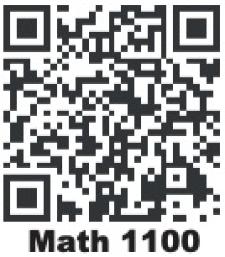Math 1100 Algebra I
PURPOSE OF MATH 1100
The purpose of all of the developmental mathematics courses is to support student success academically and beyond by advancing critical thinking and reasoning skills. Specifically in Algebra I, as a team, we will create and critique explanations and justifications. We will also determine which tools/strategies are needed to complete an argument. A theme throughout the semester is to examine statement to determine if it is sometimes true of always true. Then justify the claim with examples if the statement is sometimes true or complete explanation of every possibility if the statement is always true.
The Developmental Math Program in the Department of Mathematics at Western Michigan University offers Math 1100, a mastery-based algebra course covering the arithmetic foundations of algebra, properties of real numbers, linear equations and inequalities and systems of linear equations.
This course serves solely as a prerequisite course. Math 1100 does not satisfy any essential studies requirement.
Course Pack
There are two ways to obtain a pack.
- Purchase a math 1100 (Algebra 1) directly from R J's Printing at 1001 Second Street Monday Through Friday 8am-5pm to purchase the pack.
Note that the Metro Bus 10 has a stop on Mills and Second which is minutes from R J's Printing.
- Use the following QR code to purchase online with a credit card and chose "in classroom" to have the pack delivered to you in class. Note that a credit card surcharge will be added, so your total will be $36.14.
COURSE INFORMATION
- Course syllabus
- Resources
- graphing calculator directions (TI 83/84)
- Grid paper or select a size
- Tips for success
EXAM DATES FOR SPRING 2026 BY NUMBER
- Monday, Feb. 2; 50 minute
- Wednesday, Feb. 18; 25 minutes
- Friday, March 20; 50 minutes
- Monday, April 13; 25 minutes
If you are unable to attend class on any exam day you must notify Dr. Kirsty Eisenhart (269) 387-4117 or (269) 873-8194 before the exam, so that she can assist you in a timely manner.
TENTATIVE SCHEDULE BY WEEK
- Jan. 12 through Jan. 16: Course info, classroom environment, sometimes always
- Jan. 19 through Jan. 23: MLK day, sometimes vs always, associative property, and commutative property
- Jan. 26 through Jan. 30: Equivalent expressions, distributive property, expanding and factoring, and understanding fractions with the distributive property
- Feb. 2 through Feb. 6: Exam 1, converting from percent change and growth/decay factors, and efficient ways to handle multiple growth and decays
- Feb. 9 through Feb. 13: Converting form growth and decay factors to percent change, modeling percent change to predict or evaluate, and connect back to always/sometimes
- Feb. 16 through Feb. 20: Exam 2, finish percent change, solve verses evaluate, solving equations, and analyzing different strategies for solving equations
- Feb. 23 through Feb. 27: Solving equations continued, conditional, contradiction, identity, literal equations, system of equations with context, solving systems of equations by substitution.
- March 2 through March 6: Solving systems of equations by elimination, definition of a function, analyzing different strategies for solving systems of equations, and Spirit day
- March 9 through March 13: Spring break
- March 16 through March 20: Linear functions, three forms of a line, advantages of each form, converting between forms, and exam 3
- March 23 through March 27: Linear functions in context, practical meaning of a point, practical meaning of a slope, and practical meaning of the y-intercept, and most efficient form of a line for modeling a given linear context, convert between table of data, graph and symbolic form of a line
- March 30 through April 3: Characteristics of a good graph, interpret a given graph, determine a linear model for a given graph, and using the model to evaluate and predict
- April 6 through April 10: Adjusting the view window to see desired characteristics of a graph or system of graphs, solving graphically, what characteristics determine the number of solutions for a linear system of equations.
- April 13 through April 17: Exam 4 and linear, exponential or neither, and modeling exponential functions
- April 20 through April 24: Given a context determine if it is linear, exponential or neither and given a table of values determine if it could represent a linear function, exponential function or neither
- April 27 through April 29: Final exams
LAST DAY TO WITHDRAW
Monday, March 23 is the last day a student can process an officially withdrawal from a class to avoid a failing grade.
ALGEBRA VIDEOS
There are many online videos on Algebra I topics. As with anything viewed on the Web, one should first sift through and determine which information is of value and actually correct. The director of the Developmental Mathematics Program recommends Algebra I students view the Khan Academy videos for Pre-Algebra and Algebra I.


